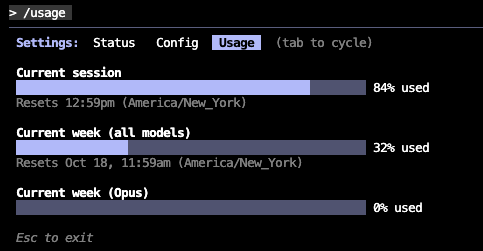Planning Better with Claude Sonnet 4.5
I’ve been using Claude Sonnet 4.5 (in Claude Code) for a couple of weeks, and two small updates changed how I plan my sessions.
The first is usage tracking. There’s now a simple command (/usage) that shows how much I’ve used Claude Code—both per session and across the week. It sounds minor, but it’s a big deal if you use Claude as a daily coding or research companion. Before this, I had no sense of how close I was to hitting limits. Now, I can see usage at a glance and plan longer sessions without getting cut off mid-run.
This, along with knowing how close I am to auto-compaction, provides me with cues to write important details of this session into persistent storage (e.g., readme, Claude.md, etc.). I’ve seen a remarkable difference in context awareness with this workflow than leaving it to the default mode for Claude to figure out from scratch (at the beginning of a new session).
It also helps me notice patterns. I can tell which projects burn the most compute, how often I switch between tasks, and when it’s better to pause instead of letting Claude run continuously. It’s become part of my rhythm: check usage, decide the next task, move on.
The second change is thinking mode. Claude 4.5 improves how it handles extended reasoning. You can tell it to “think more” or allocate a higher thinking budget. Behind the scenes, the model spends extra cycles reasoning before it writes the final response. The benefit is noticeable in multi-step work—debugging, refactoring, or reasoning about trade-offs. It feels less like a reactive assistant and more like a deliberate collaborator.
I’ve started using this intentionally. When I want speed, I keep it in default mode. When I need depth—say, explaining a complex codebase or designing a system—I turn thinking mode on. The quality lift is visible, but so is the latency, so it’s worth tuning per task.
The combination of usage visibility and controllable thinking depth has made planning smoother. I know my remaining “compute budget” and can decide when to go deep or stay fast. It’s a small thing that adds up to better pacing, clearer expectations, and fewer broken sessions.
These tools make Claude feel more predictable and more transparent. That’s what I want from AI I rely on every day: not just intelligence, but awareness of time, limits, and effort.


